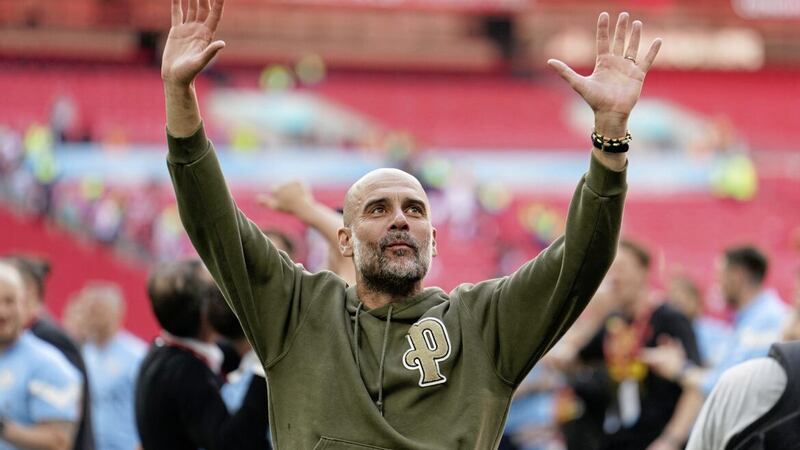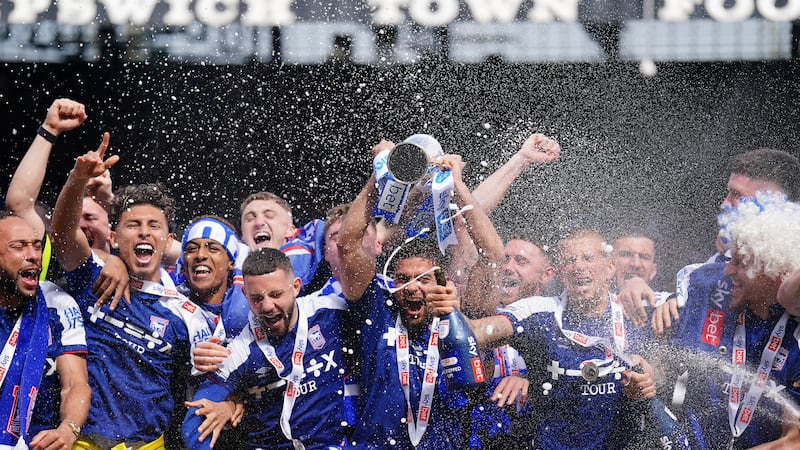AS Manchester City sit on the cusp of greatness, you wonder will they be adored like great teams of the past?
Inter Milan, their opponents in tomorrow night’s Champions League final, are a dogged, well-structured outfit who probably feel they’re on bonus territory in Istanbul – a team who finished third in Italy’s Serie A this season, 18 points adrift of runaway title winners Napoli.
In one-off games anything can happen but the prospect of Simeone Inzaghi replicating the achievements of Jose Mourinho’s Inter side of 13 years ago seems a long shot.
This season’s Champions League has always been City’s to lose. They’re the best team in Europe following the overdue recruitment of a powerful central striker in Erling Haaland.
Pep Guardiola has guided City to five of the last six Premier League championships but knows he needs to land Europe’s biggest prize to be regarded a success because the riches showered upon him as manager demand that he delivers it.
It’s not because City are deemed ‘new money’ among the game’s aristocracy; it’s more their football doesn’t really enthral the neutral.
Man City are a master-class in efficiency, but rarely do they leave you on the edge of your seat in the way Pep’s brilliant Barcelona did. Or the Treble-winning Manchester United team of ’99. Or other great teams down through the years.
City’s problem is that it’s so difficult to see past their financial muscle as so many of their games are uncompetitive.
Is this a triumph of revolutionary coaching from the lauded Catalan or the inevitable result of Sheikh Mansour’s millions?
And please only whisper the 115 charges of financial irregularity.
That’s why Liverpool’s successful assault on the Premier League title in 2019/20 was so exhilarating because there was a ‘Moneyball’ element to how they achieved it.
Liverpool had a midfield that was individually unfashionable, barely ordinary – but were moulded into something extraordinary by Jurgen Klopp.
In coaching terms, there was something more authentic about what Klopp did with Jordan Henderson, Fabinho, James Milner and the like.
Meanwhile, Man City seem so functional, over-coached and perfect and a little soulless if truth be told.
“Drama and novelty,” wrote respect football analyst Jonathan Wilson, “are elements in the construction of greatness… City might be about to win a treble in the opposite way to United, with supreme authority but almost no drama.”
Even allowing for a bit of seduction through the passage of time, Manchester United’s treble-winning exploits in ’99 were the stuff of dreams and engaged neutrals.
They won the league title by a point from a brilliant Arsenal team. They were involved in two epic FA Cup semi-final battles with Arsene Wenger’s team – games that Peter Schmeichel recently said were the best he was ever involved in.
They had a really tough two-legged battle with Inter Milan in the Champions League quarter-finals when Ivan Zamorano kept running into the human wall of Jaap Stam and Brazil's Ronaldo - playing on one leg against United at the San Siro.
Being two goals down in Turin against Juventus before Roy Keane ignited an incredible revival.
And, of course, their unbelievable comeback against Bayern Munich in the final and the indelible image of Samuel Kuffour hammering the Nou Camp turf with a mixture of rage and devastation.
Nobody gets excited about City’s stab at treble immortality because they’ve financially blitzed the field while so many elite clubs have also imploded.
Arsenal are a decent team but there was something preordained about them fading going down the home stretch this season.
Chelsea are a basket case of a club.
Man United still have too many gaps in quality in their ranks to be realistic contenders, Spurs are Spurs, Liverpool are burnt out, and Newcastle took advantage of the glaring mediocrity in the English Premiership.
So many top clubs have performed appallingly, while City have at least got their house in order, they have a system of play and a bench that would significantly improve their nearest challengers.
Man City, as a footballing entity, has become a tactical plaything for Pep Guardiola.
Is there any need for John Stones to play as a defensive midfielder? Is this revelatory in the grand scheme of things?
Was there any real need to turn Phillipp Lamh into an inverted full-back at Bayern?
He was already the best left or right full-back in the world when Pep arrived in Munich.
Did it really matter what tactical spanner Pep threw in the works because Bayern were always going to hammer Hertha Berlin.
If Pep wasn’t reinventing the game in some shape or form or transforming one of his players into something they believed they could never be, even though they were probably already world-class, what was the point of being Pep?
For all his Eureka moments and overloads and false nines and inverted full-backs and intellectualising football, Erling Haaland presented a simple truth to him about the game.
Just sometimes those 15 to 20 passes back and forth and side to side, trying to create a numerical advantage on one side of the pitch are just a bit too intricate for their own good.
These periods of possession football aren’t particularly enjoyable to watch either and are a far-cry from the speed and incisiveness Xavi, Iniesta, Busquets and Messi played with during the Tiki-taka days at Barcelona that were truly revolutionary and astonishing to watch.
They were the best team to watch since Tele Santana’s Brazil side of 1982 – only far more successful.
For that template alone, we should be thankful for the cerebral presence and energy of Pep Guardiola.
But you can get lost in your own innovation and your own sense of place in the game when probably all you need to do – especially against inferior opposition – is give the ball to Haaland.
He’ll do the rest. Man City 3 Inter Milan 0. No drama and our pulses will remain the same throughout.







